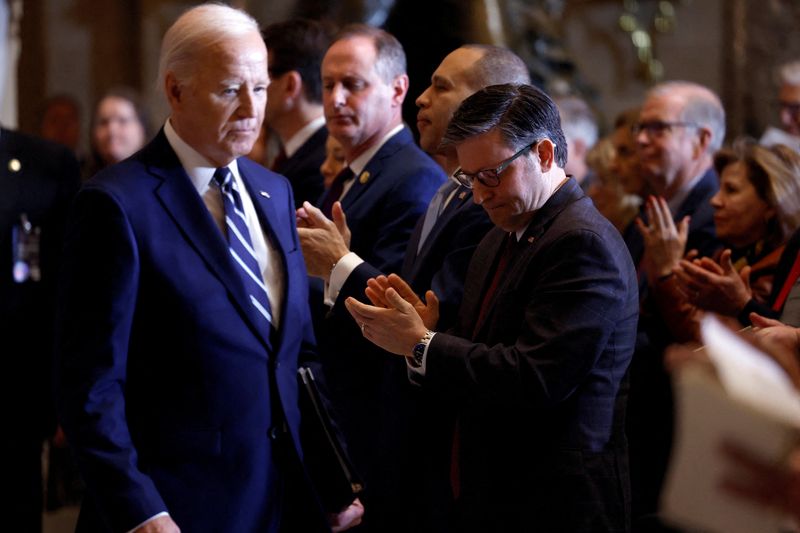By Steve Holland and Jarrett Renshaw
WASHINGTON (Reuters) -President Joe Biden and top Democrats and Republicans in Congress on Tuesday made progress toward avoiding a partial government shutdown at the end of the week, but have not cut a deal on paying for weapons for Ukraine's battle against Russia.
"We've got a lot of work to do," Biden said as the meeting opened in the Oval Office, with Vice President Kamala Harris at his side and the two top congressional Democrats and two top Republicans sitting on couches nearby.
About an hour later, there was optimism that a government shutdown will be avoided. "We will get the government funded," Republican House Speaker Mike Johnson told reporters outside the White House.
Almost two months ago, Johnson and Democratic Senate Majority Leader Chuck Schumer agreed on a $1.59 trillion discretionary spending level for the fiscal year that began on Oct. 1. But political in-fighting by Republicans who control the House of Representatives by a thin majority has made it hard for Johnson to pass funding bills.
Speaking to reporters afterward, Schumer said it was one of the most intense meetings he has ever been a part of, as the Democrats sought to persuade Johnson to agree to funding Ukraine.
"It's in his hands," Schumer said of Johnson. "We told him how important it was. It was passionate."
Johnson called the talks "frank and honest" and said his primary concern is addressing migration along the U.S. southern border with Mexico, a subject he said he returned to repeatedly including in a one-on-one session with Biden.
Biden said he believed a solution could be reached on funding the government by a Friday deadline to avoid a partial government shutdown, which he said would be damaging to the U.S. economy.
Ukraine funding becomes more urgent every day, Biden said before the meeting.
"I think the consequences of inaction are dire," he said of Ukraine.
A White House statement issued after the meeting said Biden "discussed how Ukraine has lost ground on the battlefield in recent weeks and is being forced to ration ammunition and supplies due to congressional inaction."
SHUTDOWN LOOMS, AGAIN
The spending bill is being held up by demands from ultra-conservative Republicans in the House who want to see spending cuts and policy positions injected into how dollars are spent. A group of hard-right Republicans has brought the government to the brink of a shutdown or a partial shutdown three times in the past six months.
Schumer and Johnson traded accusations in recent days over who was to blame for the stalemate. On Monday, Schumer told reporters that “Democrats are doing everything we can to avoid a shutdown."
The first batch of government funding, which includes money for agencies that oversee agriculture and transportation, will run out on Friday at midnight, while funding for some agencies including the Pentagon and the State Department will expire on March 8.
The government spending package is separate from the national security aid bill that includes Ukraine and Israel funding.
The House is under pressure to pass the $95 billion national security package that bolsters aid for Ukraine, Israel as well as the Indo-Pacific. That legislation cleared the Senate on a 70-29 vote earlier this month, but Johnson has resisted putting up the aid bill for a vote in the House.

The White House has ramped up public pressure on Johnson in recent weeks as Ukraine marked the second anniversary of the Russian invasion.
“What the president wants to see is we want to make sure that the national security interests of the American people gets put first and is not used as a political football,” White House Press Secretary Karine Jean-Pierre said. “We want to make sure that gets done.”